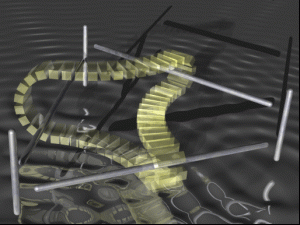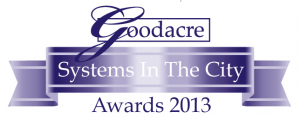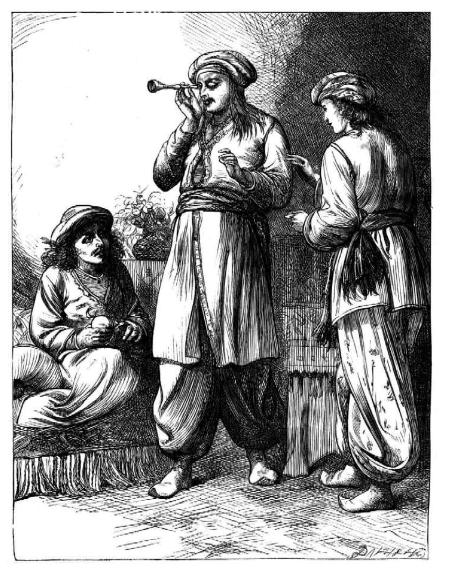It’s important to celebrate the contribution of numerous businesses towards making London the world’s leading global financial centre. I’m pleased that David Bannister continues to run his Banking Technology Awards and it’s always educational to judge them. So, on Halloween this year, Thursday, 31 October, it’ll be a scary night for some…
Technology
Science & Technology
Battle of the Quants
Working with Bartt Kellermann and Selvie Shaqiri to help bring their very successful US format here to the UK. Very interesting session today discussing this brief title – “ From the Ephemeral Quant to the Eternal Coin: Short Term vs. Long Term Considerations when Allocating to Quantitative Based Strategies”. Thankfully, some of our thoughts on Long Finance really rang a bell, and folks seemed to be interested in Asymmettric Gain-Loss Recognition, Performance Policy Bonds, Confidence Accounting, Irreversible Time, Unburnable Carbon, Internal Growth Rate as a key regulatory pension metric, and Volatility = Sustainability. Wow. Great crowd.
Battle of the Quants
Working hard to get elected and already finding that the number of speaking engagements is climbing sharply. I’m speaking next week at Battle of the Quants. This is a very popular New York event format which is coming to London a second time. I’ve been given a succinct title – ” From the Ephemeral Quant to the Eternal Coin: Short Term vs. Long Term Considerations when Allocating to Quantitative Based Strategies”. We’ll see how well this audience takes to Long Finance‘s thoughts on the long term.
Ribbon Cutting Practice
An aspiring politician also needs to practice ribbon cutting and award ceremonies. Never one to shirk a dinner and aspiring to be a good Alderman, this event looms next week:
Systems in the City Awards 2013
Prof. Michael Mainelli and Dr Iain Saville to Announce Winners
The 2013 Systems in the City Award Winners will be announced on 19th June 2013 by Professor Michael Mainelli and Dr Iain Saville OBE
The presentation dinner will be held at The Grand Connaught Rooms and includes a champagne reception sponsored by Cofunds, a 4 course dinner and evening entertainment
With only one week to go there are only a few places left.
To make sure you do not miss out email events@goodacreuk.com or call +44 (0)20 7422 0063.
Digital Migration
After many happy, though quiet, years running our own site using FrontPage, Mainelli.org migrates to WordPress with high hopes.
Dr Aleks Krotoski Asks: Do Social Media Make The World More Boring?
Real Time Club, 23 November 2010
This event garnered a significantly higher than average attendance, just squeezing into the National Liberal Club room we had. Higher attendance meant more demanding acoustics and our guest of honour did her very best to speak without a proper sound system for such a number. That said, she rose above the obstacles to set out some excellent arguments and lead a vibrant debate with the audience. Continue reading
The Eternal Coin: Physical Endurance or Digital Failure
On 15 June 2010, the Real Time Club evening’s proposition for discussion was that new technology will move beyond a facsimile of current exchange to new means of exchange that are better for society as a whole. Future e-money synthetic currencies for speculative fiction writers shouldn’t be, “that will be ten galactic credits, thank you”, but rather, “you owe me a return trip to Uranus and a kilogram of platinum for delivery in 12 months”. Well, that’s what our payments autodroid bots (i.e., mobile phones) will agree amongst themselves. Dave sets out his stall: “When you digitise something, you have the opportunity to re-engineer it. So it is with money. As money has changed from barter to bullion, from paper to PayPal, it has changed the markets and societies that depend on it. Where next?
Dave Birch opened in front of about 40 members with a reminder that Hayek always believed that money was too important to be left to governments. Dave argued that we ideally needed many units of account for many things but that multiple currencies increased the cost of transactions markedly – how could the cash register be large enough. He pointed out though that in border areas people seemed able to handle concepts of multiple currencies easily. This led to a quick reminder of the many new currencies emerging online, e.g. QQ in China, but Dave emphasised the crucial role of the mobile phone, e.g. M-Pesa in Africa. Finally, Dave touched on new currencies related more closely to real value, e.g. based on commodities, such as people in Norway using future kwHs of electricity as currency.
The core of the argument was that:
1 – we have reached a time of great change in the nature or money
2 – the mobile phone is the most important technological part of the change
3 – some of the nascent currencies will transform our view of money
Dave concluded by musing on what these changes might mean for definitions of communities and community values across space rather than being confined by geography.
Malcolm Cooper opened his reply by asserting that the mobile phone is a transient technology, witness the iPad. He believed that Dave confused the communications device with the technology. Malcolm, drawing from some of the themes in his book, “In Search of the Eternal Coin: A Long Finance View of History”, felt the aberration over history was currency. The norm is trading and storing value in a multiplicity of ways. As an example Malcolm pointed to the extent of the Carthaginian trading empire and its relatively low use of coinage.
The discussion was, as ever with the Real Time Club, quite vibrant and funny. Some comments and ripostes included:
- shouldn’t we conclude from Dave’s arguments that Nokia ought to be a bank? This led to a further reminder of the 1994 paper by Edward de Bono published by the Centre for the Study of Financial Innovation, “The IBM Dollar”;
- would Carthage have been better off or stronger with currency?
- Michael King of WDX (commercial interest) spoke of his firm’s Wocu (World Currency Unit), a basket of top 20 nations by GDP, weighted by GDP;
- Michael Mainelli raised a point about trading currencies versus stores of value (reserve currencies) and pointed out other initiatives directed at that, e.g. the UTU;
- wasn’t the deeper problem removing swings in markets, or was it perhaps that swings in markets were exacerbated by our reliance on currency?
- the use of the quote from Dostoevsky, “money is coined liberty” (House of the Dead, part 1, chapter 2) led to a ponder as to whether we are at our most vulnerable when everything is cash;
- people were reminded that fiat currency is fiat because the government only accepts the currency for tax purposes, giving government other opportunities to tax through debasement and devaluation and inflation;
- was the importance of the mobile phone the global connective power and little else, followed by a comment that these days a mobile phone was hardly that, rather a computer with a phone attached;
- a discussion kicked off on the importance of anonymity to money, including the withdrawal of cheques in the UK, and of course the Real Time Club’s interest in many things cryptographic.
The evening closed with a poem, “Liquidity”, composed on the night and read by long-standing member Andy Low:
The lake of commerce gives life its pace,
For on its smooth and shiny face,
Ripples form, surge forth and race.
(What do I want, what can I get)
They cross, connect and intersect.
The lives of people who’ve never met.
About the speakers
Dave Birch is a Director of Consult Hyperion, the IT management consultancy that specialises in electronic transactions. Here he provides specialist consultancy support to clients around the world, including all of the leading payment brands, major telecommunications providers, governments bodies and international organisations including the OECD. Before helping to found Consult Hyperion in 1986, he spent several years working as a consultant in Europe, the Far East and North America. He graduated from the University of Southampton with a BSc (Hons) in Physics.
Described by The Telegraph as “one of the world’s leading experts on digital money”, by The Independent as a “grade-A geek”, by the Centre for the Study of Financial Innovation as “one of the most user-friendly of the UK’s uber-techies” and by Financial World as “mad”, Dave is a member of the editorial board of the E-Finance & Payments Law and Policy Journal, a columnist for SPEED and well-known for his blogs on Digital Money and Digital Identity. He has lectured to MBA level on the impact of new information and communications technologies, contributed to publications ranging from the Parliamentary IT Review to Prospect and wrote a Guardian column for many years. He is a media commentator on electronic business issues and has appeared on BBC television and radio, Sky and other channels around the world. For much more, see www.dgwbirch.com
Dr Malcolm Cooper holds a First Class Bachelor of Arts in History from Dalhousie University, a Master of Arts in History from the University of Western Ontario, and a Doctorate of Philosophy in Modern History from Oxford University. His thesis on the formation of the Royal Air Force was subsequently developed into a book, The Birth of Independent Air Power, and published in 1986. His career has included a Research Fellowship at Downing College, Cambridge, management of the research programme of the Institute of Chartered Accountants in England and Wales, equity research management with three different investment banks (none of which, alas, exist today under their original name), and a five year spell as Head of Research for the City of London Corporation. His most recent post was as Head of research for the independent public policy think tank Centre for Cities.
Malcolm was the first foreigner to take up coverage of the Istanbul and Athens stock markets and spent most of his investment banking career in European emerging markets, his last post being as Head of EMEA Equity Research for ABN-AMRO (a job he gave up in 2000 – not because he could see the dot.com crash coming, but because he decided he really didn’t want to be on the Central Line at 6.30 in the morning any more). Most of his recent work has been in the UK public policy field but be retains an active interest in the more challenging parts of the world, and is still inordinately proud of having a letter published in The Times pointing out some of the more obvious problems with the UK’s current military commitments in Afghanistan. He has also published several pieces on Turkey, including an article in International Affairs, a written submission to the Commons Select Committee and a contribution to a Chatham House forecast of likely regional scenarios following the second Iraq war.
Thinking About Thinking: Introducing The Real Time Club Brain, Mind & Computing Forum
Real TIme Club at the National Liberal Club, Wednesday, 12 May 2010
Some 60 guests assembled to hear Professor John Stein of Oxford, the eminent physiologist, help members of the Real Time Club better understand the weaknesses of the brain/mind to hardware/software analogy. Continue reading
Dude – Where Is My Identity?
On 19 January 2010, the Real Time Club met at its normal venue, The National Liberal Club, with me as the Chairman. The theme of the evening was “Dude – Where is my Identity”. Some 55 Members and Guests were in attendance. Continue reading
ABCB – New Alphabet For Standards – Association of British Certification Bodies
My Lord, Ladies and Gentlemen. It is a real honour for me to have this opportunity to address a group of people who share my passion that standards markets can improve the world, this Association of British Certification Bodies. This is a personal address, not speaking as a non-executive director of UKAS, though I realise that probably had a bearing on inviting me here. My remarks to follow are not meant in any way as UKAS policy.
Yet non-executive directorships are not filled for money – the risks are high, the time commitments always exceed the estimates and the thanks are low – nor are directorships filled with love. If seeking a non-executive directorship is the first sign of madness; the second sign is probably taking one. In return, we non-executive directors can be your worst nightmare. In my case it’s because I have a passion for world trade and sustainable economies that I would like share with you.
To start with, I’d like to explore standards themselves. Standards are funny things. Because of my accent, I’m going to start with pronunciation standards. Because the name of the International Organization for Standardization (ISO) would have different abbreviations in different languages (IOS in English, OIN in French), back in the 1940’s it was decided to use a language-independent word derived from the Greek, isos, meaning “equal”. Therefore, the short form of the Organization’s name is always ISO – “I-S-O” – and ISO follows the “z” spelling as in “organization” and “standardization”. Is that clear? ISO’s recommendation on their website is to pronounce their name whichever way comes most naturally. “So, you can pronounce it “EZO”, “EYE-ZOH” or “EYE-ESS-OH”, we don’t have any problem with that.” What a great credential for flexible standards!
And then we have date standards – oh no, I’m not talking about the US month first versus the UK day first, or even the Chinese year first. For 38 years ISO has designated World Standards Day to recognize the thousands of experts worldwide who collaboratively develop voluntary international standards that facilitate trade, spread knowledge and share technological advances. ISO officially began to function on 23 February 1947, but 14 October was chosen as World Standards Day because on 14 October 1946 delegates from 25 countries met in London and decided to found ISO. Of course, in the spirit of standards, in 2006 India, Ghana and others celebrated World Standards Day on 13 October while Nigeria celebrated from 12 to 14 October. In 2007 the European Commission held its World Standards Day conference on 17 October, while the United States celebrated World Standards Day on 18 October. Need I say more?
The truth is that the world is a messy place. Moreover, it’s human nature to resist standards, or at least male nature. A friend of mine, Paul, is raising three boys on his own. When I asked him how he kept the house clean he explained, “Michael, men don’t have standards, women do. Men have thresholds.”
The objective of standards is to help the evolution from complete mess to complete order by putting things in boxes at the right time. Managing evolution isn’t easy. Sometimes we try to box things in too early. Other times we’re so late we just add cost and unnecessary complexity to existing commodities. But done right – ahh, there we add a lot of value to consumers, to business and to society. I recently conducted a large study with PricewaterhouseCoopers and the World Economic Forum looking at solving global risks, “Collaborate or Collapse”. We concluded that society solved global risks using four collaborative approaches – sharing knowledge, implementing policies, markets and, yes, standards.
Sometimes I wish we could have a better sense of humour about it all. I’d like us to avoid going down the path of political correctness and keep our largely scientific and engineering outlook on life and its problems. Sadly, certification and standard jokes are rarer than one might like. Perhaps we should have a comedy kite-mark. Fortunately, the only after-dinner/lunch joke on standards I know doesn’t concern an ABCB member. It is about certification taken to extremes over wine.
Two oenologists are trying to outdo each other on their exacting standards. They both grab a tasting glass of red wine from the examination table in front of them. Inhaling deeply, the first wine expert remarks that “this wine is an outstanding Bordeaux”. The second interjects, “particularly when you recognise the difficulties inherent in raising vines of character in Côtes de Bordeaux-Saint-Macaire”. “Indeed”, says the first, “and as this wine is from Saint-Macaire, the terroir in that area most suited to this interpretation of the Malbec grape is, I’d suspect, Château Malromé”. “Ahhh”, counters the second, “self-evidently Château Malromé, but clearly the south-facing side, near the old well.” “Elementary really”, replies the first oenologist, “and probably the fifth row, slightly higher up the hill”. “Mais bien-sur”, adds the second oenologist gaining the upper hand by saying, “though I’d say a late summer picking from the eighth vine in the row and, dare I add, probably by picked by Pierre.” “Well”, says the first, now delivering what he believes to be the fatal blow, “of course I detected Pierre’s hand on the grapes, after a cool morning and a late dejeuner. Though his post-prandial micturation infuses this wine with a somewhat disagreeable undertone.” “Naturally it does” says the second oenologist rather coolly, “as one must certainly ask why-oh-why did Pierre drink such an inferior claret for lunch?!”.
But standards are not just about quality and one-up-manship. Adam Smith advanced the metaphor of “the invisible hand”, that an individual pursuing trade tends to promote the good of his community. Yet the Doha round is stymied. Valid social and ethical concerns transmogrify into trade restrictions. Property rights are a battleground, from carbon emissions to intellectual capital. Already, emerging carbon standards are being sharpened as weapons in future carbon dumping wars. Our state sectors swell out of recognition, crowding out the private sector that delivers value. Standards and certification markets exist to improve the functioning of global markets and trade, and even to inject market approaches into monopolistic service delivery.
Adam Smith knew that markets alone are not enough. Smith’s argument is too rich to take after an excellent meal, but what I admire about certification bodies is that you exemplify Smith’s Moral Sentiments of Propriety, Prudence, and Benevolence, combined with Reason. As ABCB members you do set high standards, think to the long-term, explore new ways to help society advance and make business and government think about risk. You realize that there is more to economic life than money – as comedian Steve Wright says – “You can’t have everything, where would you put it?”
Things change fast with trade. Looking back to post-war Japan and thinking of Japan today reminds me of the apocryphal quality control tale about relevant standards. A western company had some components manufactured in Japan in a trial project. In the specification to the Japanese, the company said that it would accept three defective parts per 10,000. When the shipment arrived from Japan, the accompanying letter stated something like: “as you requested, the three defective parts per 10,000 have been separately manufactured and have been included in the consignment. We hope this pleases you.”
Today China is the sobering reminder of the importance of trade. I heard a great sound-bite at the IOD China Interest Group two years ago, “we’ve had a commercial break these past 200 years, but now we’re back, on air”. In the 18th century China was the world’s biggest economy, with a GDP seven times that of Britain’s. But China closed its doors to trade missing the industrial revolution, the capital revolution and the information revolution. There is a children’s joke that “you should never meddle in the affairs of dragons, because you are crunchy and taste good with brown sauce.” But we must mix-it-up with the Dragon. Money is odourless and poverty stinks. We must reach out to all the returnees to world trade. And we must ensure that our own standards markets are open and competitive, in turn helping world trade be open and competitive.
So, is today’s luncheon talk supposed to be slick & humorous, a call to arms or an academic lecture? Actually I want to end by emphasising the importance of conflict. Regulatory capture is a phenomenon in which a regulatory agency which is supposed to be acting in the public interest becomes dominated by the vested interests of the existing incumbents in the industry that it oversees. In public choice theory, regulatory capture arises from the fact that vested interests have a concentrated stake in the outcomes of political decisions, thus ensuring that they will find means – direct or indirect – to capture decision makers. Conflict and competition, not calm quiescence or silence, are key signs that things are working well in standards markets.
Accreditation and certification only work when the entire system is a market system, not a bureaucratic one. We are good, but we can do better. For example,
- development of a standard should be an open process involving interested stakeholders, but many ISO affiliates typically charge three figures for short documents that could be supplied electronically at no charge;
- despite our claims for openness, transparency and public benefit, certification agencies often fail to be open oto the general public about whom they’ve audited for what. Outputs such as certifications and grades awarded could be better published so that they can be validated – yet the industry complains about the ‘grey’ certification market;
- accreditors must be vigilant regulators and ensure the separation of standards development from the commercial elements of implementation and review. Yet accreditors must be realistic and engage in meaningful dialogue with the industry while avoiding regulatory capture.
I could go further and talk about the widest view of standards from financial audit through to social, ethical and environmental standards with which I also work. I’d even mention that to me, ideally, certifiers should bear some indemnity that can, with the price paid by the buyer, be made publicly available. Developing countries rightfully worry that “the things that come to those that wait may be the things left by those who got there first”. Sustainable commerce means doing things differently. We must clasp the hands of the developing countries, support the invisible hand of commerce, restrain the visible hand of government and slap the grabbing hands of special interests. We must prove that a global Commerce Manifesto deserves to replace a soiled Communist Manifesto. We must keep our standard and certification markets open, transparent and competitive.
Standards markets are the great alternative to over-regulation or naked greed. We professionals committed to standards prevent both the abuse of capitalism, red in tooth and claw, and the abuse of government regulation, 1984 but without Orwell’s sense of humour. We open up trade. Let’s sell standards markets as the new third way to the sustainable economics everyone wants.
On behalf of all the guests I salute the ABCB’s hospitality and its great work on behalf of standards markets. Thank you!







